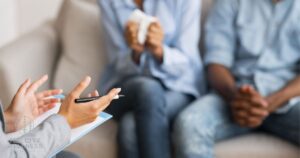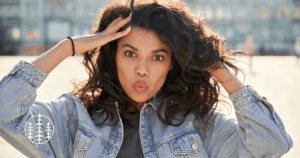If you grew up with emotionally neglectful or unavailable caregivers, chances are you often felt like the adult in the room long before you should have and now, as an adult, you’re wondering what it actually means to reparent yourself. You may have been the one your parent vented to, leaned on, or even turned to for emotional support. As a result, you might have grown up far too quickly, taking on responsibilities that no child should have to shoulder. Now, as an adult or maybe even a parent yourself, you might find yourself yearning to do things differently, to raise your own children with emotional presence and attunement. But how do you offer something you never received?
This is where the concept of “reparenting yourself” becomes essential.
What Does It Mean to Reparent Yourself?
Reparenting is the process of giving yourself the nurturing, structure, validation, and emotional safety you may not have received in childhood. It’s about becoming the inner caregiver you always needed, but never had, so you can meet your needs in the present and show up differently in your relationships, especially with your own children.
From a family systems perspective, this work is deeply interconnected. When one member of the system (you) begins to heal, it impacts the whole family. Family members may not support the changes you are experiencing or may not like boundaries you are setting because it disrupts the homeostatic rhythm that the family system has always leaned on. On the other hand, this difficult but important work can help change the trajectory for future generations, healing what is often a long-line of intergenerational trauma. Reparenting is much more than self-care, it’s generational healing.
Understanding the Mother Wound
The “mother wound” is a term that refers to the emotional pain and trauma caried by those whose mothers were unable to show up with consistency, empathy, or emotional availability. This wound isn’t about blaming mothers – many were doing the best they could with the limited tools that they had at the time. Rather, it’s about acknowledging the unmet needs, the grief of what you didn’t receive but needed, and allowing space for your inner child to feel seen and heard.
As a therapist and mother now myself, I know this work intimately. I grew up as a parentified child who often felt like the therapist of my family long before I had the official title. When I became a parent myself, I assumed I’d be fully equipped – after all, I had years of professional training and had worked with children in the early years of my career. But, as with most realities of parenting, this was an incredibly humbling transition. Becoming a mom completely flipped my world upside down. It opened a portal to parts of myself I hadn’t even met yet (even after many years of therapy). Old wounds resurfaced despite the healing that I had done. I’ve now come to realize this is quite a normal process – these wounds can ebb and flow over time. And this is why having self-compassion is the most vital part of this whole reparenting process.
How to Begin Reparenting Yourself
- Acknowledge the Inner Child: The first step is to recognize that your inner child still exists and they’re likely carrying unmet needs. You can do this through journaling, visualization, or simply noticing the moments you feel triggered, overwhelmed, or especially tender and practicing curiosity toward that part of yourself.
- Name the Needs: Ask yourself: What did I need as a child that I didn’t receive? Was it safety? Encouragement? Boundaries? Affection? Touch? Love? Identifying these unmet needs helps you begin offering them to yourself now.
- Offer Daily Nurturing: Develop rituals of self-care that mirror the kind of parenting you needed. This could be as simple as setting consistent bedtimes, making nourishing meals, practicing mindfulness, or speaking to yourself with gentleness rather than criticism.
- Create Emotional Safety: Many of us grew up with chaotic or unpredictable environments. One way to reparent is to give yourself consistency and predictability now. Grounding exercises, breathwork, and somatic-informed techniques can help regulate your nervous system and provide a felt sense of safety.
- Set Boundaries with Compassion: Saying “no” without guilt, recognizing your limits, and choosing relationships that are reciprocal and respectful; These are all ways you parent your adult self. These boundaries model healthy dynamics not just for your inner child, but also for your actual children if you have them.
- Repair the Relationship with Yourself: Offer yourself compassion when old wounds resurface. Notice when you fall into patterns of people-pleasing, perfectionism, or self-criticism, and gently course-correct. Reparenting is not about being perfect; Remember that self-compassion is your greatest tool for support and change in this process.
Reparenting Yourself While Parenting Actual Children
If you’re a parent yourself, you might notice your own childhood wounds becoming more activated in challenging moments. Your child’s tantrums might trigger your own experiences of being shamed or ignored. Their dependency might stir up your unresolved need to be nurtured. This is very normal! And also an invitation to become more aware of these moments and do things differently – for both you and your child. There is an element of grief that comes along with giving your child something that you never have – yet at the same time, there can be great joy and reward in giving your child something that you never have. Know that it’s completely okay for two feelings to be true at one time. You’re allowed to grieve what you didn’t receive. You’re allowed to be messy throughout this process.
Why Self-Compassion Matters Most
Unfortunately, reparenting isn’t a one-time event. It’s a lifelong relationship. There will be days when it feels easier, and others when it feels impossibly hard. That’s okay. The goal isn’t perfection. It’s presence. It’s showing up again and again with love and softness for yourself. And know that you’re absolutely capable of breaking cycles.
P.S.- You Don’t Have to Do It Alone
If this blog resonates with you, know that you’re definitely not alone. Although it’s not often discussed at dinner parties or work events, there are many, many people, likely even in your circle, who are experiencing similar struggles. We work with these people and support them in this journey everyday at our therapy practice. At Tree City Wellness, our therapists are trained in attachment science, inner child healing, and mind-body approaches that support your journey toward self-connection and wholeness.
You deserve support. You deserve healing. And you deserve to feel safe within yourself. If you’re curious about what this work might look like, feel free to send us a message and ask for a free consultation with one of our therapists today and take the next step in your reparenting journey.
Your inner child and your future self will thank you.





